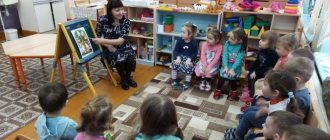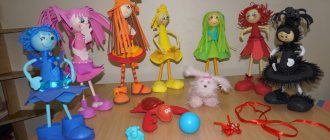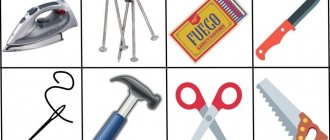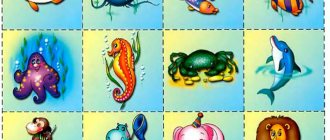Patriotic education through play
Consultation for educators.
Game as a means of patriotic education of children
preschool age
A caring gardener strengthens the root, on the power of which the life of the plant depends for several decades. Thus, a teacher should take care of instilling in his children a feeling of boundless love for the Motherland V.A. Sukhomlinsky
“It all starts from childhood” - this is the best way to relate to this issue. When thinking about the origins of patriotic feelings, we always turn to the impressions of childhood: the expanses of our native land, our native tunes, the melodic sounds of kurai. From infancy, the child hears his native speech. His mother’s songs and fairy tales open his eyes to the world, emotionally color the present, instill hope and faith in the good that fairy-tale heroes bring to us: “Abzalil”, “Alp-batyr”, “Aminbek”. Fairy tales excite, captivate a child, make him cry and laugh, show him what people consider the most important wealth - hard work, friendship, mutual assistance. Each nation has its own fairy tales, songs, games, and all of them, in their own way, with the flavor characteristic of a given people, pass on these moral values from generation to generation. The leading type of activity in preschool age is play, and at the same time, play is a powerful means of correcting children’s behavior, forming relationships, and nurturing moral and volitional qualities. Modern conditions of preschool education are characterized by an appeal to the child’s personality and the development of his best qualities. Therefore, it is the problem of forming a versatile and full-fledged personality in a kindergarten that acquires special significance. Thus, patriotic education of children is one of the main tasks of a preschool educational institution. Patriotic upbringing of a child is the basis for the formation of a future citizen, so it is very important to look for new forms of working with children in this direction. In order for the knowledge gained in classes and conversations to be strong, it is necessary to constantly consolidate it in everyday life. The use of games as a means of patriotic education is relevant. I consider it necessary to use the game as one of the active forms of work in this area, because any, without exception, types of children's games are suitable for implementing the tasks of patriotic education, helping to instill a respectful attitude towards the historical and cultural values of the native country.
Play is a natural companion in a child’s life, a source of joyful emotions and has great educational power. Therefore, in our activities we always turn to the game. In the game, the child actively rethinks the accumulated moral experience; in the game, everyone has to voluntarily give up their desires, coordinate their plans, agree on joint actions, obey the rules of the game, restrain their emotions, and overcome difficulties. The game allows you to fairly evaluate your own results and the results of your comrades. The importance of didactic games in the formation of moral and patriotic qualities of a preschooler is great. Didactic games develop intelligence, the ability to independently solve a given problem, and coordinate one’s actions with the actions of the leader and other participants in the game. In games, the qualities necessary for school are manifested and developed: voluntary behavior, imaginative and logical thinking, imagination, cognitive activity. Feelings of respect and pride for one’s country, for one’s people are instilled by didactic games with a national flavor, helping in nurturing love for one’s native land, pride, and belonging to this people. Folk games are an integral part of the moral and patriotic education of preschool children. They reflect the way of life of people, their work, way of life, national principles, ideas about honor, courage, courage, the desire to have strength, dexterity, endurance, to show ingenuity, endurance, resourcefulness. Games such as: “Yurt”, “Sabantuy”, “Shooter”, “Sun and Moon”. The joy of movement is combined with the spiritual enrichment of children. The peculiarity of folk games is that, having a moral basis, they teach children to find harmony with the world around them, form a stable, interested, respectful attitude towards the culture of their native country, and create an emotionally positive basis for the development of patriotic feelings. In terms of content, folk games are laconic, expressive and accessible to children. They stimulate active thought, help broaden one’s horizons and clarify ideas about the world around us. Before the game we talk about the culture and life of a particular people. At the end of the game, you should positively evaluate the actions of those children who showed courage, dexterity, endurance and mutual assistance. Folk games, in combination with other educational means, represent the basis for the formation of a harmoniously developed, active personality, combining spiritual wealth and physical perfection. Didactic games with objects are based on the direct perception of children, correspond to the child’s desire to act with objects and thus get acquainted with them. In games with objects, children learn to compare, establish the similarities and differences of objects. The value of these games is that with their help children become familiar with the properties of objects, size, and color. For example, when introducing children to folk crafts, embroidery, dishes from various craftsmen, dolls, nesting dolls, and birch bark products are successfully used. Board-printed didactic games are an interesting activity for children to get acquainted with the world around them, the world of animals and plants, and phenomena of living and inanimate nature. They are varied in type: “lotto”, “dominoes”, paired pictures”, “labyrinths”. With the help of board and printed games we successfully develop speech skills, mathematical abilities, logic, attention, learn to model life patterns and make decisions, educate children spirit of patriotism.
Verbal games are an effective method of nurturing independent thinking and speech development in children. They are built on the words and actions of the players, children independently solve a variety of mental problems: describe objects, highlighting their characteristic features, guess them from the description, find similarities and differences between these objects and phenomena nature. We use a lot of verbal games to develop moral feelings.
The importance of the round dance game in moral and patriotic education, in the development of the native language, as well as in the artistic development of preschool children is undeniable. The possibility of using round dances for the creative development of a child is due to the wide range of means of expression of these games and the freedom to choose the forms of children’s participation in them. The round dance game promotes the realization of individual manifestations of almost every preschooler in a joint activity.
The round dance game is gradually disappearing from the life of a modern child, so we must revive the continuity of generations, give children moral principles, patriotic sentiments, instill in children a love for Russian culture, introduce them to its origins, customs, traditions, and rituals.
Our children need modern round dances that are filled with content that is close to them, dynamic and exciting. This is an opportunity not only to sing, but also to move with adults, imitate them, be like them, while remaining children. The round dance game as a cultural phenomenon not only teaches, develops, educates, socializes, but also forms moral and patriotic qualities and is a national treasure.
Theatrical play is an effective means of socializing preschool children in the process of comprehending a literary or folklore work and developing a sense of patriotism. A characteristic feature of theatrical games is their folklore or literary basis. In games dramatizations based on folklore, children learn about the customs of the Russian people: flour was stored in barns, susekas, children were taught housekeeping from early childhood, fish were stored for the winter - the grandfather in the fairy tale caught a whole sleigh of fish. All this is played out, experienced by children, and remembered. Vocabulary is activated and improved. Children remember popular expressions, proverbs, sayings, jokes, and apt expressions: “The beaten bring the unbeaten,” “Once upon a time,” “Fear has big eyes,” “Mornings are wiser than evenings,” “They don’t care for souls.”
Dramatization games provide an opportunity not only to examine and try on folk costumes, but also to act in them, to “live” a certain period in them, to feel the warmth of a shawl on your shoulders, a kokoshnik on your head, a shirt on your shoulders, a painted sash on your belt; evaluate the advantages and disadvantages of Russian folk costume, its beauty, brightness, colorfulness, elegance.
In addition to the folklore basis for dramatization games, there is literary material that has a patriotic orientation. These are ecological fairy tales. These fairy tales instill love for native nature, a sense of empathy, compassion, a desire to help and protect nature.
Cultivating a sense of patriotism in dramatization games on a folklore and environmental basis occurs, as it were, indirectly. It does not directly say that the Motherland needs to be loved, protected, protected.
Role-playing game is used as one of the active forms of work on the patriotic education of children. It is difficult for children of primary preschool age to imagine the city as a whole, which means we introduce children to what surrounds them, namely the kindergarten and the premises located in it. We conduct acquaintance in the form of excursions. We talk about the work of people working in kindergarten. We read the relevant literature and look at thematic illustrations. Children use and consolidate the acquired new knowledge in role-playing games: “Kindergarten”, “We sing a song”, “Who looks after us in kindergarten”, “We are cooks”. Older children play games such as “Fashion House”, “Cafe”, “McDonald’s”.
The task of educators is to create an emotionally prosperous atmosphere in kindergarten, where relationships between adults and children are built on goodwill, mutual respect, where the child will feel welcome and protected. Then children will experience love and affection for their home, kindergarten, and go to kindergarten with pleasure.
The attention of older children needs to be drawn to objects located on the nearest streets: school, cinema, post office, pharmacy, etc. It is necessary to talk about their purpose and emphasize that all this was created for the convenience of people. The acquired knowledge is used in games such as “School”, “Mail”, “Pharmacy”, “Atelier”. The following games allow you to get to know your native places in more detail: “This is my street”, “Travel by bus”, “I am a hairdresser”, “Our hospital”, “Gegetable shop”.
The range of objects that older preschoolers are introduced to is expanding - this is the region and the city as a whole, its attractions, historical places and monuments. Children receive local history information about their hometown, the history of its origin, its attractions, types of transport, city buildings and institutions, people’s labor activities, famous fellow countrymen. For this purpose, excursions around the city, into nature, and observations of the work of adults are conducted. Children are very fond of travel games, so they implement their knowledge in the role-playing games “Travel around their hometown”, “Travel by bus”. Often, role-playing games are combined with construction games, which encourages children to go on a long voyage (“Submariners”, “Sailors”) or fly (“Journey to Distant Planets”, “Pilots”). At the same time, children build a boat or an airplane, a ship.
This framework allows you to cover a variety of topics. Thematic planning contributes to the effective and systematic acquisition of knowledge about the Motherland by children. Some topics are repeated and with age, children’s ideas are enriched and improved.
Planning includes mandatory preliminary work: observations of objects and phenomena of surrounding life; excursions to memorable and historical places and nature; selection of fiction on the topic; viewing paintings and illustrations; classes in modeling, appliqué, drawing, etc.
Finger games help in replenishing vocabulary and developing children’s speech, and provide an opportunity to learn about the pedagogical experience of the Russian people, who intuitively guessed the connection between speech and finger motor skills. Everyone remembers these games from childhood: “The White-sided Magpie”, “Ladushki”, “Dereza the Goat”, etc.
Games unite a child with people close to him: two dear beings sit at home, in silence, in our hectic time, playing with their fingers. Children understand their mother, and mother understands their children, and their spiritual connection grows.
Most of the games have long been known to many educators; children love and know them; our task is to collect them all from disparate sources into one collection that would be easy and convenient for educators to use in their work. I am sure that educators will be able to develop new games for the moral and patriotic education of preschoolers.
Action and plot-based role-playing games will help consolidate knowledge about the customs, traditions and life of the Bashkir people and the indigenous inhabitants of Bashkortostan.
Didactic and board games will expand children's knowledge about domestic and wild animals of Bashkiria, natural areas, cities, reservoirs and minerals, customs and traditions, and the cultural heritage of their ancestors.
The most important thing in the work of instilling patriotic feelings in children, I believe that through play, the teacher should instill in children an interest and desire to learn about their hometown, region, as well as the ability to share the information received with their loved ones.
Used Books:
1. Round dance games as a means of developing the moral and patriotic education of preschool children - Dvoeglazova I. A.
2. The use of didactic and folk games in the moral and patriotic education of preschool children - Minina E.I.
3. Patriotic education through theatrical games -
Shcherbina L. S.
4.Game as a means of patriotic education of preschool children - Zhiteneva S.V.
5. Moral and patriotic education of preschool children as one of the main directions of educational activities of the teacher - Gudovskaya N.F.
Progress of the game:
Do you have a grandfather? Where does he live? What's his name? How old is he. What is he like? Tell me what his previous profession was. And what is he doing now? How often do you meet (similar to grandma? Family is adults and children who live together, love each other and care for each other. You all have your own family. (Family tree information on the back)
.
12. Didactic game “Defenders of the Fatherland”
Goals:
1. To form an idea of the army, expand children’s knowledge about military service , and teach. 2. Introduce children to the monument to Defenders of the Fatherland in the city. 3. Foster respect for the military and the desire to be a defender of the fatherland.
Card index of games for moral and patriotic education in the senior group.
Transcript
1 Municipal budgetary preschool educational institution kindergarten 11 “Berezka” of a general developmental type Card index of games for moral and patriotic education in the senior group. Prepared by: teacher Barutkina E.A. Gusinoozersk 2016
2 Card index of didactic games for the moral and patriotic education of older children “My address” Goal: to develop the ability and knowledge of children to name their home address, the street of the city of Tolyatti, the number of the house, apartment, telephone, floor, to consolidate knowledge of the right to housing, the inviolability of the home. Material: ball Progress of the game: everyone stands in a circle, the teacher passes the ball to the child and says: “I live on the floor,” the child continues, naming his floor, and passes the ball to his neighbor, etc. “Our kindergarten” Goal: to consolidate the children’s knowledge Oh Det. kindergarten, about kindergarten workers. What duties do they perform? Where is the group, dining room, etc. located? Strengthen the ability to navigate according to a plan in space Material: photographs and illustrations of the kindergarten, kindergarten workers. Plans of the kindergarten, 1st, 2nd floors, groups Progress of the game: From photographs and illustrations, children learn and talk about the kindergarten workers. According to the plan, children orient themselves in space. “Search for kind words” Goal: to reveal with examples the meaning of the words “sorry, excuse me”, to cultivate friendly relations, to explain the need for an apology, an admission of guilt or proof of rightness and justice, the connection between words and deeds, words and attitudes Progress of the game The teacher begins a story about how to apologize, where and when, how these polite words are applied. “A journey along the route of good feelings, deeds, deeds and relationships” Purpose: to draw children’s attention to the fact that good feelings, deeds and deeds evoke a feeling of respect, friendship and love. Form friendly relationships, establish rules of etiquette, rules of behavior. Material: pictures with different scenes of good deeds, good and bad behavior Progress of the game The teacher begins a story about how one should behave in a particular place, what good actions “Our Country” Purpose: To reveal children’s knowledge about our Motherland, its capital Material : illustrations, photographs Progress of the game: the teacher shows illustrations and paintings, asks questions. The children answer. “Small Motherland” Purpose: To reveal children’s knowledge about their Small Motherland, about the history of our city, monuments and sights of the city of Gusinoozersk Material: pictures, illustrations, photographs of the city of Gusinoozersk. Progress of the game: the teacher shows illustrations and pictures, asks questions. Children answer according to the picture.
3 “Where is the monument?” Purpose: to introduce children to monuments, to teach them to navigate in their hometown Material: images of monuments Progress of the game: The teacher shows children images of monuments, asks them to tell where this monument is installed. “Find out from the description who it is?” Goal: to consolidate children's knowledge of the animal world of their native land. Instill love for the Native land, for the Motherland Material: Pictures and illustrations depicting the animal world. Progress of the game: The teacher describes the animal, the children guess. “Folk crafts” (assemble a pattern) Purpose: to introduce children to folk crafts, instill an interest in Russian traditions, teach them to recognize and distinguish different crafts. Material: cut-out pictures and images with folk art objects. During the course of the game, the teacher shows a picture with the image of folk art objects, the children name and collect. “Flag of Russia and Buryatia” Goal: to help consolidate knowledge of the flag of your country, (city, region) to consolidate the main colors of the flags, what do they mean? Material: cut-out pictures Game progress: The teacher shows the children the flag of Russia and the flag of Buryatia, removes them and offers to collect the cut-out pictures in that order. “Coat of arms of Russia and Buryatia” Purpose: to help consolidate knowledge of the coat of arms of one’s country, city, to consolidate knowledge of what is drawn on the coat of arms and what it means Material: a picture of the coat of arms cut into 6-8 parts Progress of the game: The teacher shows the children the coat of arms of Russia and Buryatia , and invites children to create a coat of arms as one whole from parts of the picture. “Who lives in what country?” Goal: to expand children's knowledge about the world and the people who inhabit it. Material: paintings and illustrations with different countries of the world and people. Development of speech, logical thinking, formation of the ability to use the suffik -ets Procedure: The teacher shows images and asks to determine what country this person is from and what he will be called Chinese-Chinese, Africa-African.. “Countries and peoples” Goal: Expand children’s understanding of countries of the Earth and their peoples. To instill an interest in the lives of people with different lifestyles, cultures and traditions. Instill respect for the culture and traditions of different peoples of the world. Material: globe, map of the World, pictures and illustrations depicting different countries and peoples of the world Progress of the game: The teacher shows a picture depicting different countries and peoples of the world. Talks about them.
4 “Human Dwelling” Goal: To consolidate children’s knowledge about human dwellings, about what they are made of, to instill a love for their home, the Motherland. Material: pictures and illustrations depicting a person’s home. Progress of the game The teacher begins the story about where a person lives, that there are different types of housing: yaranga, hut, hut. “What holidays do you know?” Goal: To develop children's intelligence and memory, to consolidate knowledge about holidays, (folk, state, religious) to consolidate the rules of behavior in public places. Material: pictures and illustrations depicting holidays, postcards for various holidays. Progress of the game The teacher begins a story about the fact that there are different holidays, shows cards and postcards. Offers to choose a card with a holiday, and a themed card for it. “Continue the proverb” Purpose: to introduce oral folk word-making, develop speech, memory, and logical thinking. Material: Progress of the game: The teacher begins the proverb, the children continue it. “Name who” Goal: to introduce children to the main people of the Russian Federation and Buryatia. Material: portraits of famous compatriots Game progress: The teacher shows the portraits, invites the children to name the person depicted in the portrait and tell what he is famous for. “Tell about your family” Goal: To form an idea of yourself as a family member. Show the importance of family in a person’s life. Develop a desire to talk about your family members, be proud of them, love them. Material: Photo album compiled together with parents with family photographs with the family tree of the family “Polite words” Purpose: To instill in children a culture of behavior, politeness, respect for each other, a desire to help each other. Material: plot pictures depicting different situations: a child pushed another, a child picked up a fallen thing, a child feels sorry for another child, etc. Progress of the game. The teacher shows the card and offers to compose a story based on the picture. “Trip around the city of Gusinoozersk” Purpose: to introduce you to your hometown, the sights of the city, and cultural monuments. Material: album of photographs of their hometown, illustrations and postcards depicting the city’s attractions Progress of the game: The teacher shows the children photographs of the city’s attractions and asks them to name them.
5 “Where is the monument?” Purpose: to introduce children to monuments, to teach them to navigate in their hometown Material: images of monuments Progress of the game: The teacher shows children images of monuments, asks them to tell where this monument is installed. “Find out who it is by the description” Purpose: to consolidate children’s knowledge of the animal world of their native land. Instill love for the Native land, for the Motherland Material: Pictures and illustrations depicting the animal world. Progress of the game: The teacher describes the animal, the children guess, “Folk crafts” Purpose: to introduce children to folk crafts, instill an interest in Russian traditions, teach them to recognize and distinguish various crafts. Material: pictures and images with folk art objects. During the course of the game, the teacher shows a picture with the image of folk art objects. Children name.
Progress of the game:
To protect our peace with you, there is an army. It consists of soldiers, officers, generals and admirals. They are all called military. The military is a very honorable profession, because they are the defenders of our Motherland. What types of military are there? Tankers are military men who serve on tanks. Military sailors serve on warships. Rocketeers are well versed in rocket technology. Military pilots fly military planes and helicopters. Border guards protect our borders from enemies. Artillerymen – shoot from huge cannons and mortars. Submariners guard our borders in submarines. Paratroopers - they know how to neutralize any enemy, they shoot well, and they jump with a parachute. Sappers - find and neutralize mines placed by the enemy.



